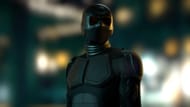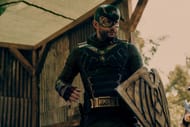In the world of The Boys, which is filled with darkness and grit, superheroes are not the saviors that society believes them to be. Among them stands out a character named Black Noir. Behind his mask and silent demeanor lies a haunting past that is intertwined with an aspect of his personality: his imaginary friends.
Exploring the enigma surrounding Black Noir's past and the peculiar connection he shares with his allies reveals the depth and complexity of this formidable character. As we delve deeper into the story we come to realize that his journey is not about physical prowess and superhero battles, it also delves into psychological exploration examining the traumas that have shaped him.
From an encounter with Soldier Boy, a renowned member of the superhero group Payback to a life-changing incident that left him disfigured, Noir's history is filled with moments of pain and fear closely tied to his imaginary companions. This article delves into the details of Black Noir's past while examining how these haunting memories manifest themselves through his unique bond with imaginary friends.
The dark secrets of Black Noir: Unraveling the connection with his imaginary friends
Black Noir's imaginary friends are the deep-seated childhood traumas he experienced. These friends serve as a means for him to confront and grapple with his apprehensions surrounding Soldier Boy.
Season 3 delves into his past, uncovering the events that led to the emergence of his imaginary friends. These companions hold a captivating role within his persona. They not only serve as a reflection of his traumas but also provide him with solace and inner strength.
In the episode titled Here Comes a Candle to Light You to Bed, Black Noir flees upon discovering that Soldier Boy is still alive. He seeks refuge at an abandoned Buster Beavers pizza restaurant, where he again conjures up Buster and his friends in his mind. These imaginative companions serve as manifestations of his childhood trauma, aiding him in confronting his apprehensions regarding Soldier Boy.

Black Noir’s trauma and hatred towards Soldier Boy stems from their troubled past. Their history is marked by complexity. Both individuals were once part of Payback, a superhero team sponsored by Vought International. Unfortunately, Soldier Boy subjected Noir to abuse, regularly subjecting him to violence and derogatory remarks. These experiences left Noir harboring a hatred towards him.
In the gripping episode Herogasm of season 3, we discover that Black Noir betrayed Soldier Boy by selling him out to the Russians. This act served as retribution for the suffering Noir endured at the hands of Soldier Boy.
Further insight into the relationship between Noir and Soldier Boy is unveiled in the thought-provoking episode Here Comes a Candle to Light You to Bed. This installment reveals that Black Noir was originally known as Earving and was a boy when he was taken in by Vought and subjected to experimentation.

Soldier Boy never allowed his team members to shine independently, instead, he always insisted on overshadowing them. When confronted about his actions by Black Noir, in front of their teammates, the Payback's leader did not respond well. He aggressively assaulted Earving making it clear that any future challenges would be met with the threat of his life being taken.
However, in the midst of a battle, Earving sustained significant injuries. The flames inflicted damage to his brain and disfigured half of his face, which ultimately led him to wear a helmet for the rest of his life.
It was through the animation the writers skillfully portrayed glimpses of his past by introducing us to his friends. This decision to employ animation in depicting Noir's backstory demonstrates the show's creator’s brilliance. Animation allowed for an exploration of his trauma in a manner that would have been challenging to achieve through live-action storytelling.
Why did Homelander kill Black Noir?
In the season 3 finale of The Boys, Homelander made the decision to end Black Noir's life. His reasoning behind this was rooted in a sense of betrayal, as he had chosen to keep information about Soldier Boy, who happened to be Homelander’s father, hidden from him. This revelation infuriated Homelander and led him to act out of intense anger by taking his life.
Furthermore, Homelander’s growing feelings of paranoia and insecurity regarding his origins played a significant role in his actions. He perceived Noir as a threat and believed that eliminating him would remove that danger.
The demise of Noir marked a moment within the show. It showcased the lengths to which Homelander was prepared to go in order to safeguard his own interests. It also highlighted the reality that Homelander lacks genuine companionship since he considered him someone he could rely on but ultimately discovered otherwise.
